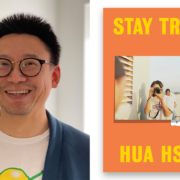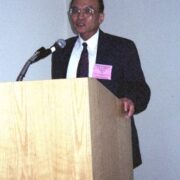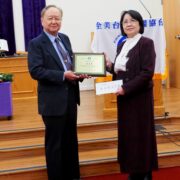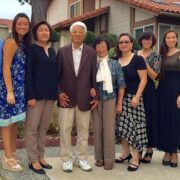My Journey across Two Cultures
A Talk at the American Woman’s Club of Cranbury
by Sue Shwu Lih Lin (林淑麗)

Feb. 1, 2006
George Orwell, author of “Animal farm” and “1984,” once addressed the question of “ Why I Wrote,” : “All writers are vain, selfish, and lazy, and at the bottom of their motives there lies a mystery. Writing a book is a horrible, exhausting struggle, like a long bout of some painful illness. One would never undertake such things if one were not driven on by some demon whom one can neither resist nor understand…” It is refreshingly self-depreciative and honest. I recalled his words of wisdom whenever my friends asked me why I wrote “普林斯頓散記” (“Random Notes from Princeton.”)
Just like many of us, I liked to read since a child. I also liked to write and had won highest prizes in essay competition during elementary school. My diaries in middle high school reflected the typical aspiration of good students, but were sprinkled with occasional social criticism. So my father suggested that I pursued career in law or journalism. But given who I was and how I grew up, I did not follow the right formula—becoming a lawyer, a professor, or at least married to a rich guy, as my family had hoped. The passion of defying gravity, to go the end of the world until the end of time in order to prove something, was a process of its own. Writing memoir gave me the time to reflect, to dig deep inside. It is therapeutic.
In the August of 1974, I boarded a Northwestern Airline, in Taipei, Taiwan, and landed in San Francisco around mid-night. The city of light I saw from the window of the plane had stayed in the memory to this day. From then on, life had been a constant struggle—to meet the challenge of academic and professional development and raise a new family in a transplanted existence. All was under control more or less until the summer of 1994, when I was diagnosed with colon cancer. This illness became the climax of my fear of death since childhood, and a wake-up call to my very existence.
Cranbury, a National Register designated historic town, is a perfect backdrop for my reflection. Why so? A neighbor once told me, “This is a lovely town, but it needs a little sparkle.” I smiled in agreement. Then one day, I was quite disturbed after hearing about the conduct of a respected friend. I came back home from Princeton and drove around aimlessly. The atmosphere of a little town with lots of history suddenly became so tranquilizing. Then I passed the Veterans’ Memorial Park and the Brainerd cemetery, where eighty Independence War soldiers were buried. Somehow, it reminded me that some “core values” in life are still worth preserving and dying for.
In 1999, two years after moving to Cranbury, I joined the Woman’s Club of Cranbury. Befriending with American women in the town and vicinity not only gave me a sense of belonging, but also provided valuable opportunity to learn American culture in intimate and cozy settings. This added a new dimension to my experience, and enriched my writing. While looking back at my life spanning across the two shores of Pacific Ocean, I also learned more about the American society, the immigrant community, and the affairs in Taiwan. It gave one a sense of living in the margin of both societies, but also created opportunities for contrasting observations, and forced me to relearn history and culture, as a way of reconciliation. The process is in fact very American, since we are living in a country of immigrants. It also served to illuminate my writing.
I belong to the early vintage of baby boomers. But the type of environments in a post-colonial, post WWII Taiwan was quite different from that of a victorious super power such as United States. For example, I noticed since a child, that adults around us stressed the virtue of obedience and the manners of conformity a lot. It bothered me. But I kept it to myself. Women, of course, accepted second-class status. The concept was as simple as the sky was blue. It made me very unhappy. Worst of all was how my grandfather treated my father. The base color of my early life is grey, to say the least. It is a world I grew to escape from, and to rebel against…
In a way, the book is a confession and redemption of a rebel. There are three sections in the book: “A Trail from Southern Taiwan,” “New World, Old World,” “At the Threshold of 21st Century.” Today I will focus on two of the articles in the first section, because those two are frequently mentioned by the readers, and are quite typical of my writing.
The first article, “Nylon Panty Hose Journey,” is like an opera with three ACTs. The narrative started with watching my mother pulling up “nylon panty hose” from the tip of the toe during the 1950s. Nylon panty Hose was a symbol of glamour. It was also a cornerstone of the petrochemical technology. In ACT I, the story weaved together the evolution of technology and the coming of age of a girl from southern Taiwan in the 1970s. To prove her worth, she joined the boys’ rank in studying chemical engineering. Act II began with the description of a glass fiber as thin as one hundredth of a hair, and yet carrying one million time as much information as that of coaxial cable. The transition from nylon fiber to optical fiber was a quantum leap, signaling the dawning of information age. The stage shifted from college campus in Taiwan to a well-integrated, cutting edge research/design/manufacturing facility in Branchburg, New Jersey, where prototype fiber-optic transceivers were still in the design verification stage. Pioneers in the field of digital communication worked side by side with aspiring young scientists and engineers. Multidisciplinary brainstorming led to innovation, which she had the gratification to be a part of by leading the investigation of a patent in the technology of impurity activation for LEDs (Light Emitting Diode)
In ACT III, the protagonist eventually landed in the beautiful corporate compound of RJR Nabisco , the manufacturer of Ritz, Oreo and all sorts of biscuits, as well as tobaccos. Here, leveraged buyout was the name of the game and was the story behind a mini TV series called, “Barbarian at the gate.” By the end of the story, the protagonist had become a worn-out woman. Now in in her early 40s, she saw her career going nowhere, knew no way out, and unaware of troubled waters ahead—Doctor’s pronunciation of “cancer” was only two years away.
The second article, “Remembering my Father: Bereavement and Redemption,” is a narrative consisting of seven subtitles: 1) Remembrance ; 2) Legend from an Old Town in Southern Taiwan; 3) An Orphan Coming of Age During WWII ; 4) Why not Fighting Back?; 5) History’s “Law of Inertia”; 6) Portrait of a Medical Doctor; 7) “Fate” knocked at the Door. For the rest of this talk, I would spend more time in describing the background of the second article. This, in a way, also partly address the theme– “redemption”
My father was born to a landlord family in southern Taiwan, in a town called Fengshan, where early immigrants from China settled. The Qing dynasty of China established a county seat here. The earliest generation of my ancestors arrived in Taiwan as an officer in the arms/law enforcement capacity. The Lin family became quite rich three generations later through entrepreneurship, accumulated considerable wealth in my great-grand father’s time. Unfortunately China fought a war with Japan over the dominance of Korea Peninsula and lost. As a result, Taiwan was ceded to Japan for colonization. From then on, the Lin family gradually lost clout. My father was born in 1918. His mother died when he was seven, which changed the course of his life. My grandfather was a cold and irresponsible man. He later married a young woman from the working class. As you may imagine, she gave my father hell. One year before the end of WWII, my father earned a medical degree in Japan and returned to southern Taiwan for medical practice.
There was air raid by the allied force bomber, and epidemic was rampant. This young doctor was on call 24 hours a day. Worst of all, my grandfather and the step grandmother deprived him of most of the hard-earned money. Thus, when he became ill with pneumonia, he could not afford to take break from his medical practice, neither buy nutritional supplement. The accumulation of fluid in the right lung during this time left permanent damage. He was only twenty-seven years old then, five years before I was born. The tension over money cast a shadow in my childhood memory. The showdown between my father and grandfather came when I was eight years old. But it was too late anyway. The burdens of earning a living while in poor health, and the trauma of breaking up with his father took a toll. One day around 1964, he vomited blood while visiting a friend. A team of doctors in a leading hospital pronounced he had less than five years to live.
“Why my father never dare to stand up to his abusing parents until too late?”
I asked the same question even in 1999, when I started to brainstorm for the, “Remembering my father,” article. But then I was in my middle age, away from the island of Taiwan for twenty-five years, survived colon cancer for five years. These are life-transforming experiences. So I began to ask, “Is it fair for us to judge him as if we knew any better?” At the brainstorming stage of my writing, I had the world history book in front of me, trying to recreate the atmosphere of the colonial time during which he grew up without a mother. I also cast my sight on the CNBC TV screen as a daily routine. The stock market of late 1999 was gradually brewing to a climax for bubble. And yet people were more optimistic than ever. During this time, the story of the tulip-mania in the 17th century Holland came to my attention. Here was some description from the British encyclopedia:
“Tulip was introduced to Europe from Turkey around 1550. It became so popular that, by about 1610, a single bulb of a new variety was acceptable as dowry for a bride. Eventually, homes, estates, and industries were mortgaged so that bulbs could be bought for resale at higher price. The crash came early in 1637, when doubts arose as to whether prices would continue to increase. Almost overnight the price structure for tulips collapsed, sweeping away fortunes and leaving behind financial ruin for many ordinary Dutch families.”
This is the beginning of redemption, the beginning of my awakening to the universal vulnerability of humans to their circumstances. In my father’s situation, the Confucius dogma of paternal authority was “the only core value” he could hold onto, at a time when government came and went, and the value of money depreciated one-thousandth times overnight. In restoring this man, to whom I owed my life, to his right place in history, I also learn to look at people and myself differently.
A question arises after I observe more the subtlety of similarity and difference in human behaviors, regardless of race, nationality and cultural backgrounds. The question is: Why some nations rise and others fall? How, during the course of history, cultures and societies became differentiated? In what way the immigrant experiences can uniquely contribute to the sustainability and vitality of this great nation we call United States of America? (This article is a condensed version of the original speech)
源自 林淑麗





